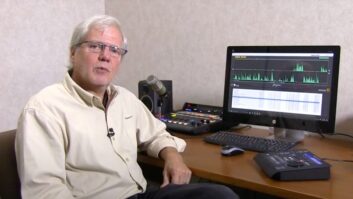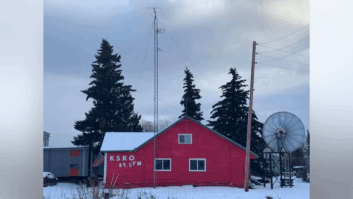WHITE PLAINS, N.Y. — May 3, 2018 — SMPTE®, the organization whose standards work has supported a century of advances in entertainment technology and whose membership spans the globe, has extended the SMPTE ST 2110 Professional Media Over Managed IP Networks standards suite with the publication of SMPTE ST 2110-40. This new document maps ancillary data packets (as defined in SMPTE ST 291-1) into Real-Time Transport Protocol (RTP) packets that are transported via User Data Protocol/Internet Protocol (UDP/IP) and enables those packets to be moved synchronously with associated video and audio essence streams.

“SMPTE ST 2110-40 maps ancillary data into RTP packets, complementing the existing video and audio portions of the SMPTE ST 2110 suite,” said SMPTE Director of Standards Development Thomas Bause Mason. “This advance is momentous because it means that, thanks to the ST 2110 standards suite, every element that has been part of the traditional SDI studio can now be put into an IP studio.”
The SMPTE ST 2110 standards suite specifies the carriage, synchronization, and description of separate elementary essence streams over professional IP networks in real time for live production, playout, and other professional media applications. SMPTE ST 2110 separately routes the individual essence streams (audio, video, and ancillary data), which simplifies, for example, the addition of captions, subtitles, and Teletext, as well as tasks such as the processing of multiple audio languages and types. It also enables the efficient carriage of next-generation image formats with new features, such as HDR over IP, that may require metadata.
The new ST 2110-40 standard will join previously published documents in the SMPTE digital library at library.smpte.org, which is hosted on the IEEE Xplore platform:
- SMPTE ST 2110-10/-20/-30 — addressing system concerns and uncompressed video and audio streams
- SMPTE ST 2110-21 — specifying traffic shaping and delivery timing of uncompressed video
During the 2018 NAB Show, the new SMPTE ST 2110 standard suite was a primary focus of the IP Showcase, supported by SMPTE, Audio Engineering Society (AES), Alliance for IP Media Solutions (AIMS), Advanced Media Workflow Association (AMWA), European Broadcasting Union (EBU), IABM, and Video Services Forum (VSF).
SMPTE is offering a Virtual Classroom course on ST 2110, and the newly published ST 2110-40 standard will be a focus of the course. The course assumes a basic understanding of IP and associated terminology. The SMPTE Virtual Courses “Introduction to Networks,” “Routing and Switching Essentials,” and “Essentials of IP Media Transport for Broadcasters: Moving Real-Time Video and Audio over Packet Networks” are not required to register for “Understanding SMPTE ST 2110.” However, these courses enable a deeper understanding of IP, internetworking, and many essential concepts that are referenced in the ST 2110 suite of standards and are recommended to be completed before enrolling in “Understanding ST 2110.” SMPTE Virtual Classroom course descriptions and registration are available at www.smpte.org/courses.
More information about SMPTE ST 2110 standards is available at www.smpte.org/st-2110. Further information about SMPTE and its standards work is available at www.smpte.org.
# # #
About SMPTE®
For more than a century, the people of the Society of Motion Picture and Television Engineers, or SMPTE® (pronounced “simp-tee”), have sorted out the details of many significant advances in media and entertainment technology, from the introduction of “talkies” and color television to HD and UHD (4K, 8K) TV. Since its founding in 1916, SMPTE has received an Oscar® and multiple Emmy® Awards for its work in advancing moving-imagery engineering across the industry. SMPTE has developed thousands of standards, recommended practices, and engineering guidelines, more than 800 of which are currently in force today. SMPTE Time Code™ and the ubiquitous SMPTE Color Bars™ are just two examples of SMPTE’s notable work. Now in its second century, SMPTE is shaping the next generation of standards and providing education for the industry to ensure interoperability as the industry evolves further into IT- and IP-based workflows.
SMPTE is a global professional association of technologists and creatives who drive the quality and evolution of motion imaging. Its membership today includes more than 7,000 members: motion-imaging executives, creatives, technologists, researchers, and students who volunteer their time and expertise to SMPTE’s standards development and educational initiatives. A partnership with the Hollywood Professional Association (HPA) connects SMPTE and its membership with the businesses and individuals who support the creation and finishing of media content. Information on joining SMPTE is available at smpte.org/join.
All trademarks appearing herein are the properties of their respective owners.
Link to Word Doc: www.wallstcom.com/SMPTE/180503SMPTE.docx
Photo Link: www.wallstcom.com/SMPTE/SMPTE_Thomas-Bause-Mason.jpg
Photo Caption: SMPTE’s Director of Standards Development Thomas Bause Mason






